6 Best Canva Alternatives for Fast, Affordable Design in 2026
Find 6 reliable Canva alternatives that are uncomplicated, more intuitive, or cheaper. We've selected tools that maintain Canva's ease of use while addressing common frustrations like customer service issues and recent price increases.


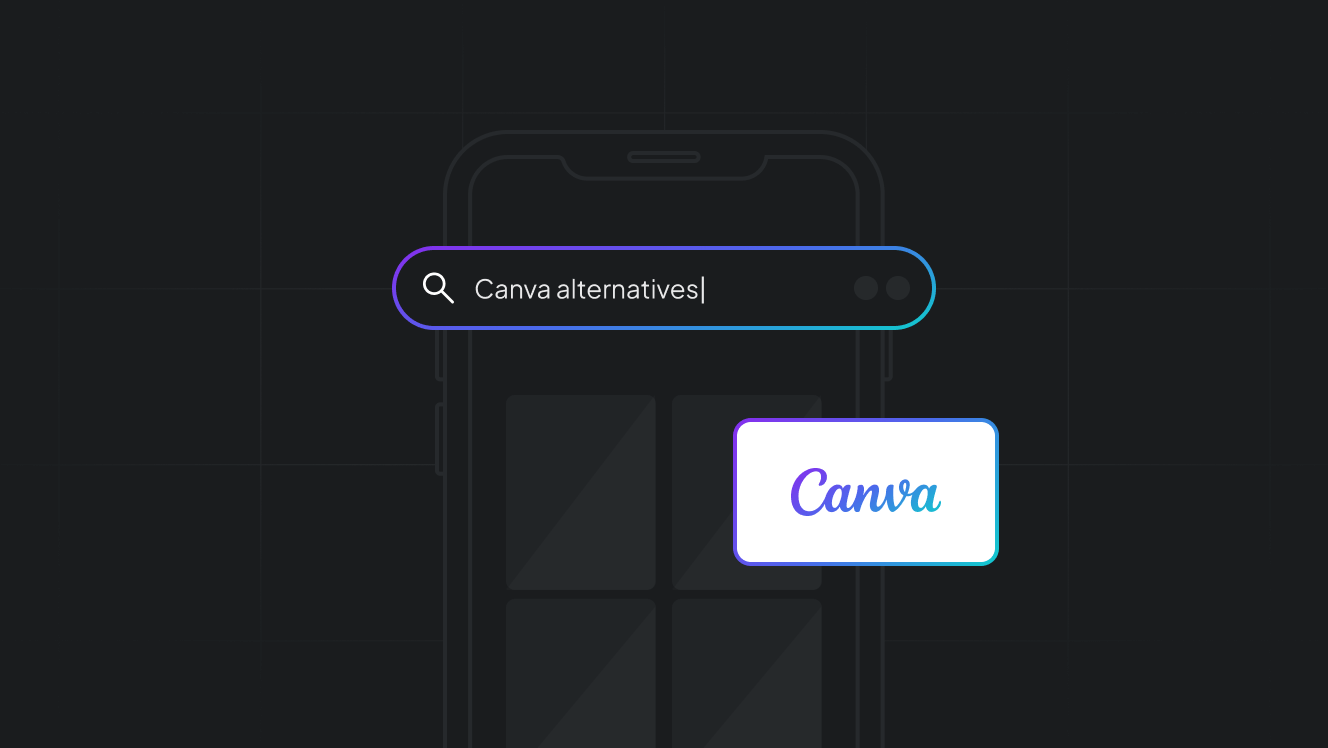
You're here most likely because Canva's customer service is nearly non-existent, or those recent price hikes are stretching your budget too thin.
This comparison guide will introduce you to #6 Canva alternatives that offer either more affordable pricing, better automation features, or superior AI capabilities compared to Canva.
Because Canva is intuitive and widely used, we made sure our alternatives share those same qualities.
Each tool on this list is easy to use, offers some form of automation, and lets you get started within minutes. Read on to find your best pick!
Canva alternatives at a glance
| Tool | Price Details | Best For | Main Feature |
|---|---|---|---|
| Cropink | Free for 25 products, $39/month | High-volume product ads | Auto-generates catalog ads from a product feed |
| Visme | Free plan (limited), $12.25/month/user | Presentations and data-rich visuals | Advanced charts and infographic tools |
| Creatopy | 7-day free trial, $36/month | Scaling ad creatives across platforms | AI-generated ads from a website URL or prompt |
| Adobe Express | Free plan, $11.59/month | Users already in the Adobe ecosystem | Seamless sync with other Adobe tools |
| VistaCreate | Free plan, $10/month | Small businesses creating marketing content | 200K+ templates with a Canva-like editor |
| Pixlr | 7-day trial, $9.99/month | Photo editing and touch-ups for product images | AI tools for background removal and image cleanup |
1. Cropink
Cropink is a catalog ad creation tool designed for ecommerce businesses that need to generate large volumes of product ads quickly.
You simply upload a product feed URL or file, and Cropink transforms your plain product images into attractive, high-converting ads for Facebook, Instagram, Snapchat, and TikTok.
With Canva, you design each ad individually. Cropink takes a different approach by automating the entire process. The tool includes hundreds of templates across virtually any industry, so you can create 500+ catalog ads in minutes rather than hours.
It's an ideal pick for Black Friday campaigns, A/B testing product images with price drops, or updating campaigns automatically without manually changing each ad.
There's no limit to the number of designs you can create with Cropink. Pricing is based on the number of products you modify, not team members, which keeps costs predictable as your team grows.
And because you sometimes need more control over your designs, Cropink provides a Figma plugin for your advanced design needs.
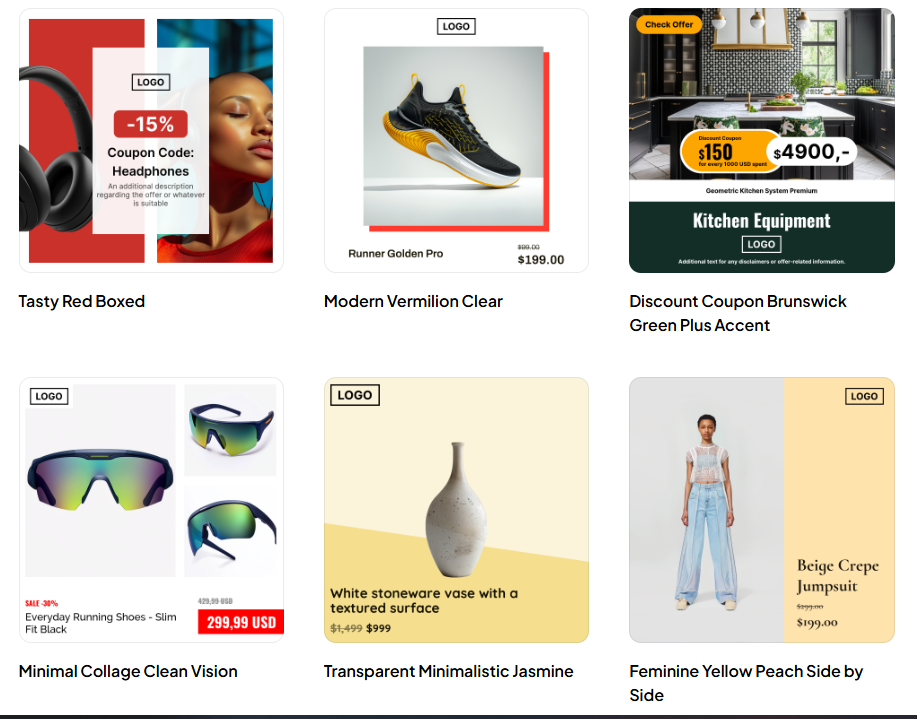
Key features
- Enrich product ads with reviews, feature callouts, discounts, and pricing details
- Upload your brand kit to maintain visual consistency across all your ads
- Automation that lets you create hundreds of ads from a single product feed
- Figma plugin for custom ad modifications when needed
- Team collaboration and ad preview capabilities
- A/B testing for different ad designs
- Rule-based design management for dynamic product ads
Pricing
- Free plan covers 25 products
- $39/month for 500 products with all features included
- Simple, plug and play interface
- Automation at every corner
- The Figma plugin gives you greater design control
- Brand kit keeps all your ads on brand
- All features included regardless of plan
- Pricing based on products, not team members
- Doesn't support video creatives like Canva does
Canva vs. Cropink
The main difference between Canva and Cropink is the level of automation. Canva is better for one-off designs or marketing visuals requiring a human touch. On the other hand, Cropink is more suitable for ad automation at scale. Canva gives you creative control and visual storytelling, while Cropink is the better choice when you need speed, scale, and automation for ecommerce product ads.
2. Visme
Visme is a template-based design platform for creating social posts and ads on a smaller scale. The tool features the same drag-and-drop editor you'd expect from Canva.
Where Canva focuses on quick creative content, Visme leans heavily into professional presentations and data visualization. You get access to hundreds of professional social media templates for Facebook, Instagram, Twitter, and LinkedIn, plus specialized tools for creating reports, charts, and infographics.
Visme also gives you access to high-quality stock photos and lets you upload your own images and brand colors. Like Canva again, Visme also offers a social media scheduler to help streamline your content workflow.
You can store slides, templates, photos, and brand information directly in your Visme dashboard, with folder organization to keep different content types easily accessible.
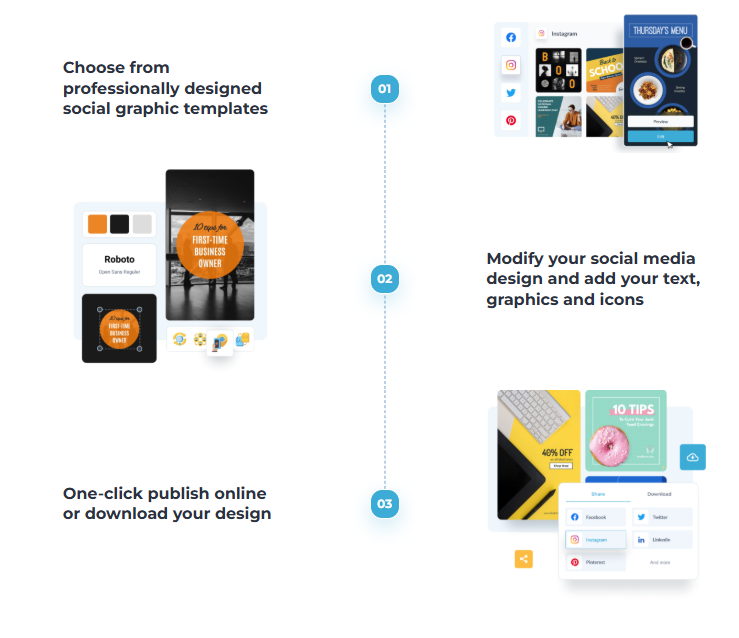
Key features
- Store and organize content into folders within your dashboard
- Team commenting and collaboration features
- Download options include JPEG, PNG, PDF, PowerPoint, HTML5, video, or GIF
- Wide variety of templates across different content types
- Social media scheduling functionality
Pricing
- Very limiting free plan (you can't download designs without paying)
- Starter plan at $12.25/month per team member (no brand kit or collaboration in the Starter plan)
- Wide variety of templates available
- Easy to use with an aesthetically appealing interface
- Excellent features for professional presentations and data visuals
- Not truly free despite claims (designing is free, downloading requires paid subscription)
- Limited collaboration features on lower-tier plans
- More expensive per user than some Canva alternatives
Canva vs. Visme
The main difference between Canva and Visme is their content specialization. Canva is good at quick, creative content like social media posts and ads, while Visme is better for professional presentations and data-rich visuals.
3. Creatopy
Creatopy is a design platform for scaling ad production across multiple platforms and audiences. The tool shares Canva's intuitive interface but adds more advanced AI capabilities.
Canva requires you to build each creative from scratch or a publicly available template, but Creatopy takes automation several steps further.
You can upload your site URL and the platform will automatically create ads using your existing content. The tool also lets you build dedicated brand kits, upload assets like fonts and logos, and manage multiple brands simultaneously.
Creatopy supports over 100 ad platforms, and its export options are tailored to each network's specific requirements.
The platform can automatically generate multi-language ad variations and includes an AI copywriter to handle your ad text. You can even launch campaigns using custom ad tags hosted directly on their servers.
If those features don’t fit your needs, be sure to check out these Creatopy alternatives.
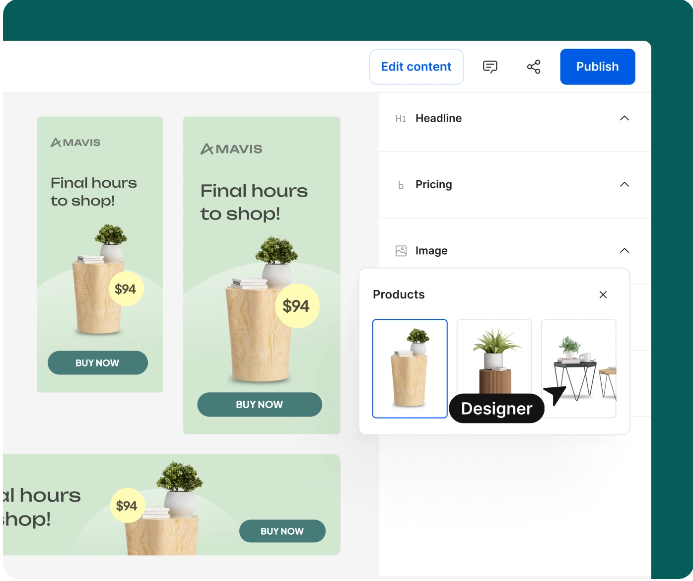
Key features
- AI ad generation starting with just a website URL or text prompt
- Support for 100+ ad platforms with platform-specific export options
- Multi-language ad variations generated automatically
- AI copywriter for ad text creation
- Custom ad tags and campaign launch capabilities
- A/B testing for different design elements
- Brand kit management for multiple brands
Pricing
- 7-day free trial
- $36 per month for just 100 monthly export credits
- Extensive AI features for ad creation and copywriting
- Automation capabilities across the entire workflow
- Intuitive and simple to use
- AI copywriting and translation features save significant time
- Supports more ad platforms than most alternatives to Canva
- Only 100 exports per month, which is much lower than Canva's unlimited downloads
- $36/month for single users vs Canva's $12.99/month makes it more expensive
Canva vs. Creatopy
The main difference between Canva and Creatopy is the level of ad campaign automation and platform readiness. Canva works well for social content with a hands-on creative approach. Creatopy is better for scaling ad production as it lets you generate multiple ad variations, auto-adapt to 100+ platforms, and create ads from just a website URL or AI prompt.
4. Adobe Express
Adobe Express handles graphics for virtually any social platform and also provides automatic resizing capabilities for any asset.
You can create content seamlessly across your desktop browser and phone, because files sync automatically so you can pick up exactly where you left off. The platform includes brand kit functionality and element locking features similar to Canva, plus access to video clips, images, music, and animations for video creation.
While Canva operates as a standalone design platform, Adobe Express integrates smoothly into the broader Adobe ecosystem. It's pretty valuable if you already use tools like Photoshop or Illustrator in your workflow.

Key features
- 100,000+ templates, 1,000,000+ design assets, and 1,000+ fonts
- AI image generation built into the platform
- Resizing and file conversion features for multiple platforms
- Design previews shareable via link
- Content scheduling across social media platforms
- Full integration with Adobe Creative Suite
Pricing
- Limited free plan available
- $11.59/month for individual use
- Team pricing starts at $5.79/month per member
- Integrates seamlessly with all other Adobe products
- Simple, easy to understand interface
- Extensive template library so you won't start from scratch
- Strong animation and motion graphics capabilities
- Lower quality templates on the free plan
- Individual design elements aren't easily editable
- AI image generator produces inconsistent quality results
Canva vs. Adobe Express
The main difference between Canva and Adobe Express is their target user base. Canva offers more refined templates and intuitive user control for standalone design work. Adobe Express provides better cross-platform continuity and integration for users already invested in Adobe's creative suite, but it leans toward creative professionals rather than general business users who need quick, polished designs.
5. VistaCreate
VistaCreate is a graphic design platform that supports small businesses with their marketing materials. The tool offers thousands of free templates and includes an AI image generator.
You'll appreciate that editing in VistaCreate feels similar to working with Canva, so there's minimal learning curve if you switch.
Rather than trying to be everything to everyone like Canva, VistaCreate concentrates on business-focused design needs. You can create video posts with animated text effects, transitions, and objects, plus upload your brand colors, fonts, and logos to maintain consistency across projects.
The collaboration features let you invite up to 10 people to work on projects simultaneously, with live chat support always available when you need help.

Key features
- 200,000+ professionally-designed templates
- AI image generator for custom visuals
- 170M+ creative assets including photos, videos, and vectors
- Brand kit where you can upload colors, fonts, and logos
- Video creation with animated text effects and transitions
- Team collaboration for up to 10 people simultaneously
- Custom background options
Pricing
- Limited free plan
- $10 per month for the paid plan
- High-quality templates across different social platforms
- Intuitive interface similar to Canva
- Live chat support is always available
- Affordable pricing for small businesses
- Fewer advanced features compared to other alternatives
- Limited customization options for individual elements
- Smaller template library than major competitors
Canva vs. VistaCreate
The main difference between Canva and VistaCreate is their scope and business focus. Canva is a broad, multi-use design platform for creating everything from social media posts to presentations and branded assets. VistaCreate, in contrast, works better for small businesses needing marketing materials like print products, ads, and social media content.
6. Pixlr
Pixlr is a photo editing suite that includes design tools and AI capabilities. All the editing tools are accessible directly through your browser without downloading software.
The platform is different from other Canva alternatives in that it focuses heavily on photo enhancement and manipulation.
Where most design platforms start with templates, Pixlr excels at converting raw product photos into polished visuals. With Pixlr, you can access an AI image generator and AI video generator, plus specialized features for creating studio-quality product images in seconds.
Pixlr also provides an extensive collection of AI-powered editing tools that automatically handle tasks like background removal, object removal, image upscaling, and noise reduction.
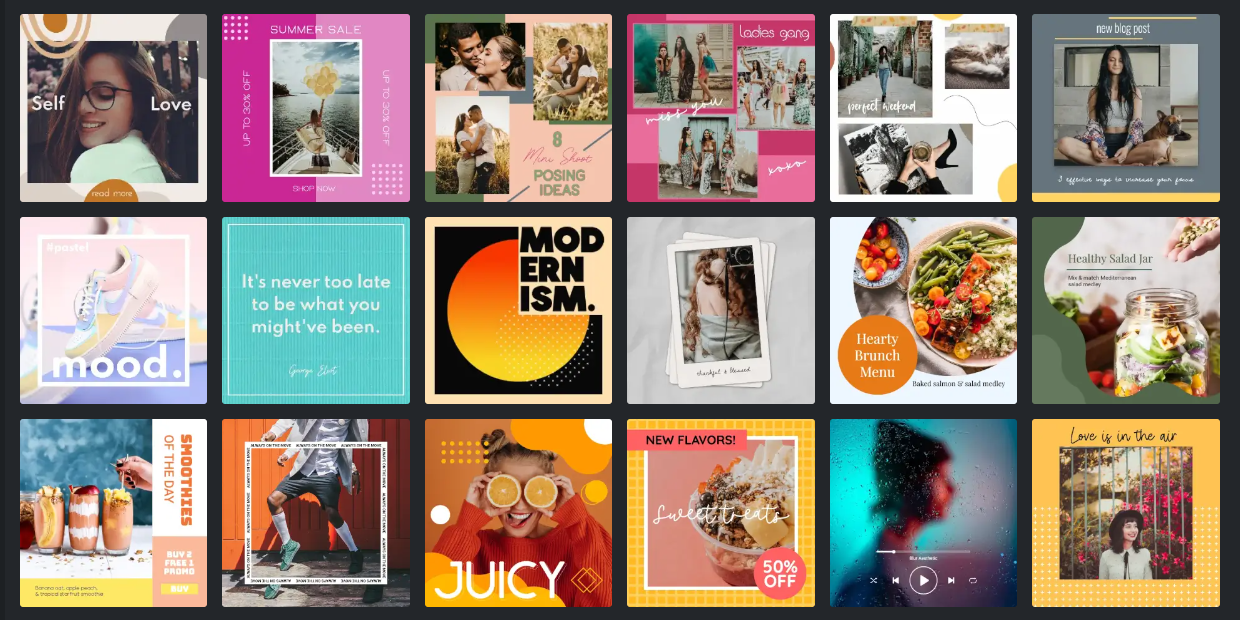
Key features
- AI image and video generators for creating custom content
- Bulk photo editing for processing multiple images at once
- AI-powered editing tools including generative fill, background removal, and object removal
- AI sticker maker and backdrop generator
- Image enhancement tools like upscaling, sharpening, and noise reduction
Pricing
- 7-day free trial available
- $9.99/month for individual use
- No software download required (browser-based)
- Excellent AI-powered photo editing capabilities
- Bulk editing saves time for high-volume image processing
- A bit cheaper than Canva for individual use cases
- Pretty useful for product photography enhancement
- Focuses more on editing individual photos than building complete designs
- No real-time team collaboration features
- Previously free features now require paid subscription
- Platform frequently experiences technical issues and downtime
Canva vs. Pixlr
The main difference between Canva and Pixlr is their core functionality and design approach. Canva is a comprehensive graphic design tool for creating complete marketing materials from scratch. Pixlr functions primarily as a photo editor with design capabilities as a secondary feature.
Tips to choose the best Canva alternatives
- Define the goal you want to accomplish.
Each of these tools can perform multiple design-related tasks, but some excel in certain things more than others. So, before you choose a Canva alternative, decide whether you want to create ads at scale, edit your product photos, or access AI capabilities.
- Consider how many other people you work with
All tools except Pixlr have some form of team collaboration features, but for many, adding team members means increasing the monthly price you pay. Cropink is the exception since pricing is based on products, not team members.
- What is the volume of your monthly design needs?
Small-scale users creating occasional social posts or marketing materials can focus on template quality and ease of use. However, prioritize automation features and bulk capabilities if you need to produce hundreds of designs.
Summary and recommendation
Below is a simplified use case for each of these Canva alternatives:
- Cropink: Best for ecommerce teams running high-volume product ad campaigns.
- Visme: Best for teams creating professional presentations and data-reliant marketing materials.
- Creatopy: Best for marketing teams and agencies requiring advanced AI ad generators.
- Adobe Express: Best for creative professionals already using Adobe products.
- VistaCreate: Best for small businesses creating small-scale marketing materials and social media content.
- Pixlr: Best for ecommerce businesses needing advanced photo editing alongside basic design.
FAQs
If you're creating individual designs occasionally, Canva remains hard to beat for ease of use and template variety. However, if you need bulk ad creation, advanced AI features, or professional presentations, Cropink, Creatopy, and Visme ( in that order) offer better value and functionality for those specific use cases.
VistaCreate works best for small businesses focused primarily on marketing materials, but it's not necessarily better overall. Canva offers more templates, better collaboration features, and broader functionality across different content types. VistaCreate's main advantage is its lower price point and business-focused approach, if that matches your needs.
Yes, Canva offers a free plan that includes basic design tools and templates, though with some limitations on premium elements and features.
Cropink is the best alternative for high-volume social media advertising because it automates the entire ad creation process from product feeds. You can generate hundreds of platform-optimized ads in minutes rather than creating each individually.
Try Cropink out. It’s free for 25 products!
Sources
- Cropink. What Is a Brand Kit?
- Cropink. Top 7 Creatopy Alternatives for AI Ads

Damaris is a Digital Marketing Specialist who writes about digital marketing and performance marketing. At Cropink, she creates data-driven content to help businesses run better ad campaigns for better performance and ROI.

Leszek is the Digital Growth Manager at Feedink & Cropink, specializing in organic growth for eCommerce and SaaS companies. His background includes roles at Poland's largest accommodation portal and FT1000 companies, with his work featured in Forbes, Inc., Business Insider, Fast Company, Entrepreneur, BBC, and TechRepublic.
Related Articles












How Can Cropink Help?
Start with Cropink is easy and free
No credit card required